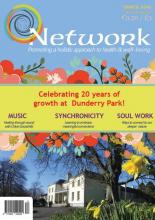You are here
Home › Articles › Ecopsychology and Transpersonal Practices: Cultivating a Sense of the Greater WholeEcopsychology and Transpersonal Practices: Cultivating a Sense of the Greater Whole

Ecopsychology explores the relationship between humans and the natural world understanding that there is a synergy between the health and wellbeing of the planet and the health and wellbeing of the person. It is a synthesis of the studies of ecology and psychology: Ecology examines both the living (biotic) and non-living (abiotic) systems, cycles and process that maintain and sustain all life on the planet, and Psychology looks at how humans think and how this influences how we act and behave. Ecopsychology therefore explores the effects our thoughts and actions have on our immediate environment and the wider world around us.
It is clear as we bear witness to the devastating ecological disasters that are becoming more frequent and intense, that how we think and act, particularly in the western world is out of sync with the workings of natural systems and processes. ‘Climate Change’ - a simplistic phrase, is used to describe a much broader complex crisis: the collapse of natural systems and cycles across the entire biosphere. What we experience as climate disruption; changes in sea temperatures, changing wind direction and intensity, changing cloud formations affecting levels and frequency of precipitation, all emanate from a variety of human practices. The degradation of land and soil; the eradication and destruction of terrestrial ecosystems for a variety of uses leading to biodiversity loss; the disruption of global Hydro, Nutrient, Carbon and Nitrogen cycles; the erosion and depletion of microbial biological life in soil compromising carbon and nitrogen fixation. The broad systemic disruption to ecological processes across the whole biosphere, reflects the effect the psychology of the western mind is having on the biosphere.
‘The challenges of Earth do not originate from climate processes or ecological systems – they all come from the human psyche. Our unexamined narratives and practices promote the interconnected crisis affecting our lives, culture and the planet.’ Lori Pye, 2018
The modern western mindset was born out of the time of the ‘Enlightenment’ when the scientific model began to develop and take hold. Scientific methodologies cultivate a reductionist, rationalistic and mechanistic view. Only what can be directly observed is valid, what cannot be seen, is not valid. Everything can be viewed as if a machine, everything can be measured. The ‘whole’ can be understood by splitting, fragmenting and reducing into parts to be separately examined. The anthropocentric belief that ‘Man’ with rational scientific knowledge was superior and separate from nature and that nature was created for human use and exploitation, became embedded in the culture. This way of thinking is the psychological bedrock of the modern western mind.
Humans however, are not separate (an impossibility) but a part of the living structure of the world and how we think has an effect on the workings of the whole. Ecopsychology, Depth psychology and Transpersonal psychology share the view that the self and psyche as understood in modern psychology is inadequate, it is too limited. A broader understanding of self and psyche is required; one that acknowledges the human psyche as infinitely larger than current mainstream psychology proports.The psyche is enormous; a phylogenetic ecological psyche deeply rooted into the living record and evolution of all life on Earth, while also infinitely expanding into the universal cosmos; a composite of human and non-human entities, materials, experiences and worlds.
The challenges we face in our modern times are rooted into the foundations of the limited and separate modern mindset. Science has provided a flood of information, facts and details, what has gotten lost and drowned out in the flood is an overall sensibility of wholeness. Transpersonal practices help us to cultivate sensibilities of wholeness as they offer a doorway into an experience of the broader psyche. Entering into altered states of consciousness offers the opportunity to explore and experience aspects of self and psyche that take us beyond limited rational ego consciousness. These practices act as aids in expanding and deepening into a sense of relatedness with a wider whole.
Practices like meditation, ecstatic dance, shamanic journey work, sacred use of plant entheogens, chanting, music, prayers and mantras, active imagination, breathwork, visualisation and dream work, stretch and enlarge our conceptual framework and our limited concept of self. Transpersonal experiences broaden our sense and range of possibilities and potentialities and encourage previously unthought of or conceived ideas. We may discover and have revealed to us things we had not considered offering surprising, unlikely, insightful and inspirational answers and solutions. These experiences expand the dimensions of our thinking and knowing, and we can learn from them how to understand and relate with the wider non-human world in new ways. This in turn effects and informs our actions and behaviours in the world.
As a meaning-seeking, meaning-making species we organize ourselves and make sense of the world by forming and re-forming stories and narratives to live by that reflect the cultural values and needs of the time. The challenge of our modern times is to evolve the narratives we live by from the outdated and limited separate, reductionistic, mechanistic to more inclusive, co-operative ones that encourage whole systems thinking and align with a sense of care for the Earth. In shifting and re-arranging the tectonic plates, the bedrock of our psychology, a new form of relationship can evolve and grow; one founded on sensibilities of interrelatedness with the wider whole.
Homo sapiens have a capacity unique to the species; a capacity for symbolic thinking. Symbols represent that which is not easy to comprehend and cannot be describe concretely. Symbols are a symbol for a reason. It is our symbolic capacity that allows us hold onto bigger picture concepts, concepts that the rational mind finds hard to grasp. Engaging in practices that take us into the wider psyche allows us receive inspirations, Images, symbols, visions and insights from that place. These emerge through the body, and if we choose, can be brought forth into manifestation in the world. They help us envision and incorporate new ways of being in the world re-aligning our thoughts and actions to work in reciprocity with the hard to grasp large ecological systems that sustain all life on Earth.
The human psyche and imagination (that which can’t be seen and can’t be measured) is a dynamic creative, productive force, it is a natural resource. It fulfills the function of connecting us with the larger whole; a function that is as much a part of the human species as any other function. The imaginal human life force is part of the life force of the world, interconnected with the complex systems and processes of the planet. In meeting the global sized challenges of our times, it is good to know we have access to an enormous regenerative, restorative, inspirational resource that is as deep as the depths of ecological time and as wide as the infinite cosmos. Engaging with the whole, we may be better able to meet the needs of the whole. Transpersonal practices are an invitation to utilise the unique gift of our species in service to the good of all.
Lucy Dolan holds a BA in Design, MA Ecopsychology, Cert Transpersonal Therapist Training.
www.claycup.ie
[email protected]
Upcoming exhibitions and talks:
- FÉILE na BEALTAINE, 2020: 1-3 May 2020, Dingle. Co. Kerry
If you would like to support this project and help to get this exhibition off the ground in May please visit here - ART and PSYCHE Symposium, LSAD, Limerick, August 2020
Latest Issue
Upcoming Events
-
17/04/2020 to 26/04/2020
-
18/04/2020
-
23/04/2020
-
15/05/2020 to 23/05/2020
-
16/05/2020 to 17/05/2020
Recent Articles
Article Archive
- November 2011 (2)
- January 2012 (3)
- February 2012 (2)
- March 2012 (2)
- April 2012 (4)
- May 2012 (4)
- June 2012 (1)
- July 2012 (3)
- August 2012 (2)
- October 2012 (2)

